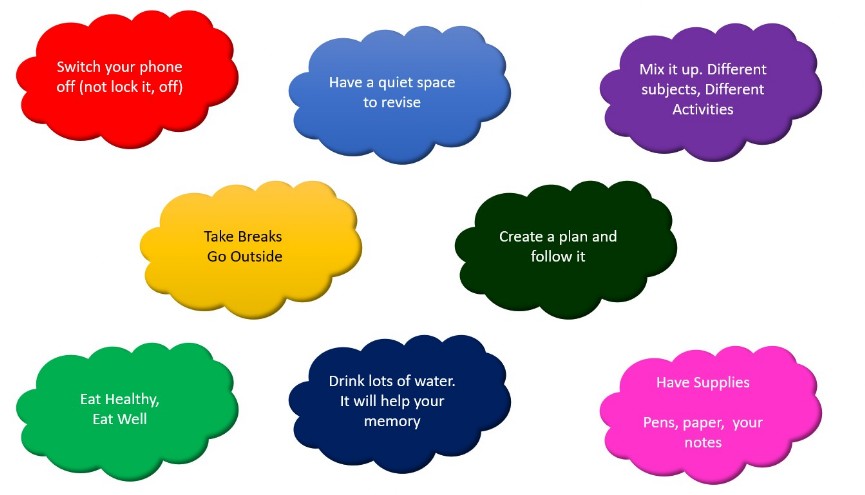How to revise
This page jumps straight to how to revise. If you want to understand more about why revision is necessary, why / when you forget things, how much revision you should do and when then have a look at this page.
The aim of learning is for you to know, understand and be able to recall and use information and techniques in different (subject) areas.
Learning is a process that happens over time. It can be split into three phases - recording new knowledge, simplifying the knowledge and learning and testing. Each phase has its own steps and tools. The second and third phases (blue and yellow) are what most people would traditionally call revision.
You need to successfully complete all of the phases to have learnt something. The other pages in this section talk about the different areas and tools.

Phase | Recording New Knowledge Phase | Simplifying New Knowledge Phase | Learning and Testing Phase | |||||||
Step | 1 | 2 | 3 | 4 | 5 | 6 | 7 | 8 | ||
Step Description | Make accurate Notes in Lessons | Check you understand the notes and the topic | Summarise your notes | Create Visual Summaries | Learn the Material | Test Yourself | Re Learn areas you got wrong | Re Test to check | ||
Tools and Techniques for this Step | Cornell Note technique Use headings Use someone elses notes if yours are not up to it | Try and answer questions on the topic with notes in front of you | Organise into key points Re write it Use bullet points Use Headings and Subheading | Create Mind Maps or Lotus Diagrams Create Timelines (if appropriate) Create flowcharts showing processes | Read it through, try and memorise it Use Memory Aids : -Mnemonics, -Number tricks for dates, -Memory Walks or Stories | Cover sections and try to write out what it said Use questions _ flash cards, online quizzes, paired testing Do exam questions Do Past Papers | ||||
Which loss if helps to avoid | loss a) lack of attention | loss b) no rehearsal, no short term maintenance | loss b) no rehearsal, no short term maintenance | loss c) no elaborate rehearsal, no long term storage | loss c) and d) no eleborate rehearsal and failure to retrieve from long term memory | loss d) failure to retrieve from long term memory | ||||
The mind is a complex thing and it is very easy for it to lose focus, and the time you spend on learning and revision to become far less effective.
Here are some tips on how to make your revision easier on you. Note the one about phones - your phone will distract you if you give it half a chance. The apps on it are designed to make you want to use it. Do not lie to yourself about how you can work with it next to you - scientists did the research - you can't.

